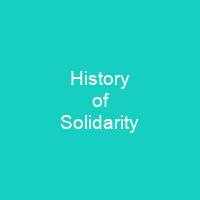Solidarity was the first independent labor union in a Soviet-bloc country. It is considered to have contributed greatly to the fall of communism. Poland’s communist government attempted to destroy the union by instituting martial law in 1981. In the 1990s, Solidarity’s influence on Poland’s political scene waned.
About History of Solidarity in brief
 Solidarity was the first independent labor union in a Soviet-bloc country. It is considered to have contributed greatly to the fall of communism. Poland’s communist government attempted to destroy the union by instituting martial law in 1981, followed by several years of political repression, but in the end was forced into negotiation. In the 1990s, Solidarity’s influence on Poland’s political scene waned. A political arm of the Solidarity movement was founded in 1996 and would win the Polish parliamentary elections in 1997, only to lose the subsequent 2001 elections. The first strike started on July 8, 1980 in the State Aviation Works in Świdnik. In July 1980, Edward Gierek’s government, facing economic crisis, decided to raise prices while slowing the growth of wages. At once there ensued a wave of strikes and factory occupations, with the biggest strikes taking place in the area of Lublin. On August 14, 1980, the shipyard workers began their strike, led by electrician Lech Wałęsa, a former shipyard worker who had been dismissed in 1976. The committee demanded the rehiring of Anna Walentowicz, a popular crane operator and activist, and galvanized the outraged workers into action. The strike was organized by the Free Trade Unions of the Coast, organized by LechWał�’sa and led by the Electrician Workers’ Association of Gdańsk and the Workers’ Defence Committee, which had originally been set up in 1976 to organize aid workers.
Solidarity was the first independent labor union in a Soviet-bloc country. It is considered to have contributed greatly to the fall of communism. Poland’s communist government attempted to destroy the union by instituting martial law in 1981, followed by several years of political repression, but in the end was forced into negotiation. In the 1990s, Solidarity’s influence on Poland’s political scene waned. A political arm of the Solidarity movement was founded in 1996 and would win the Polish parliamentary elections in 1997, only to lose the subsequent 2001 elections. The first strike started on July 8, 1980 in the State Aviation Works in Świdnik. In July 1980, Edward Gierek’s government, facing economic crisis, decided to raise prices while slowing the growth of wages. At once there ensued a wave of strikes and factory occupations, with the biggest strikes taking place in the area of Lublin. On August 14, 1980, the shipyard workers began their strike, led by electrician Lech Wałęsa, a former shipyard worker who had been dismissed in 1976. The committee demanded the rehiring of Anna Walentowicz, a popular crane operator and activist, and galvanized the outraged workers into action. The strike was organized by the Free Trade Unions of the Coast, organized by LechWał�’sa and led by the Electrician Workers’ Association of Gdańsk and the Workers’ Defence Committee, which had originally been set up in 1976 to organize aid workers.
At its height, the movement claimed some 9.4 million members. In December 1990, LechWAIL was elected president of Poland, and in December 1990 he became the first Polish president to be a member of the European Union (EU). In December 2000, he was elected to the European Parliament for the first time, as well as to the Polish Academy of Sciences and the University of Warsaw. In January 2001, he won the Polish presidential election for a second time, becoming the first Pole to do so. In March 2001, the Polish parliament elected a new president, Andrzej Duda, and he was re-elected for a third time in December 2007. In April 2008, the party won a seat in the European Parliamentary elections, but lost the subsequent elections in June 2008. In October 2008, Duda was elected the president of the Republic of Poland for a fourth time, and became the country’s first openly gay president. In November 2008, he announced that he would not run for re-election in the next election. He was succeeded by his son Lech, who was elected as president in December 2009. In 2010, he resigned from the post of president and was replaced by his nephew, Jadwiez Wojtyła. In 2011, he moved to a new job as a teacher in the city of Kraków. In 2012, he became a director of the Polish Institute of Technology, a position he had held since the 1970s. In 2013, he founded a foundation to promote the development of Polish technology.
You want to know more about History of Solidarity?
This page is based on the article History of Solidarity published in Wikipedia (as of Dec. 03, 2020) and was automatically summarized using artificial intelligence.







